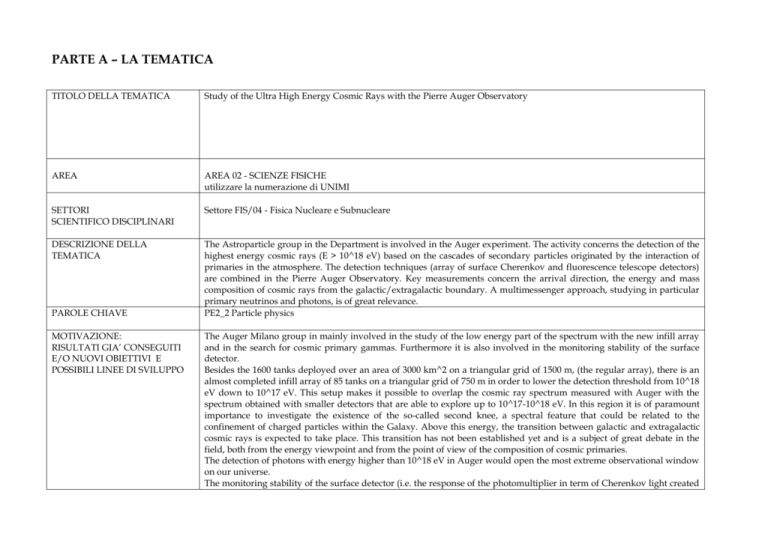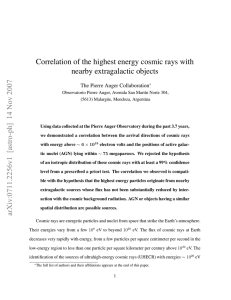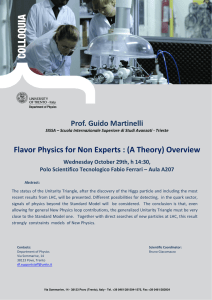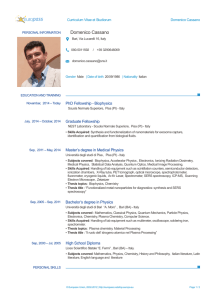titolo della tematica - Dipartimento di Fisica
advertisement

PARTE A – LA TEMATICA TITOLO DELLA TEMATICA Study of the Ultra High Energy Cosmic Rays with the Pierre Auger Observatory AREA AREA 02 - SCIENZE FISICHE utilizzare la numerazione di UNIMI SETTORI SCIENTIFICO DISCIPLINARI Settore FIS/04 - Fisica Nucleare e Subnucleare DESCRIZIONE DELLA TEMATICA The Astroparticle group in the Department is involved in the Auger experiment. The activity concerns the detection of the highest energy cosmic rays (E > 10^18 eV) based on the cascades of secondary particles originated by the interaction of primaries in the atmosphere. The detection techniques (array of surface Cherenkov and fluorescence telescope detectors) are combined in the Pierre Auger Observatory. Key measurements concern the arrival direction, the energy and mass composition of cosmic rays from the galactic/extragalactic boundary. A multimessenger approach, studying in particular primary neutrinos and photons, is of great relevance. PE2_2 Particle physics PAROLE CHIAVE MOTIVAZIONE: RISULTATI GIA’ CONSEGUITI E/O NUOVI OBIETTIVI E POSSIBILI LINEE DI SVILUPPO The Auger Milano group in mainly involved in the study of the low energy part of the spectrum with the new infill array and in the search for cosmic primary gammas. Furthermore it is also involved in the monitoring stability of the surface detector. Besides the 1600 tanks deployed over an area of 3000 km^2 on a triangular grid of 1500 m, (the regular array), there is an almost completed infill array of 85 tanks on a triangular grid of 750 m in order to lower the detection threshold from 10^18 eV down to 10^17 eV. This setup makes it possible to overlap the cosmic ray spectrum measured with Auger with the spectrum obtained with smaller detectors that are able to explore up to 10^17-10^18 eV. In this region it is of paramount importance to investigate the existence of the so-called second knee, a spectral feature that could be related to the confinement of charged particles within the Galaxy. Above this energy, the transition between galactic and extragalactic cosmic rays is expected to take place. This transition has not been established yet and is a subject of great debate in the field, both from the energy viewpoint and from the point of view of the composition of cosmic primaries. The detection of photons with energy higher than 10^18 eV in Auger would open the most extreme observational window on our universe. The monitoring stability of the surface detector (i.e. the response of the photomultiplier in term of Cherenkov light created in the water contained in the 1600 tanks) is important for the measurement of the cosmic ray spectrum. New possible lines of development are related to some Auger enhancements; in particular the muon detector system for the Infill array with the aim to detect the missing energy component and to determine the primary composition. Finally, we are collaborating in the effort to study the possibility of detecting cosmic rays by molecular-bremsstrahlung induced microwave radiation. PARTE B – IL / I PROPONENTE/I L. Miramonti PROPONENTE/I COMPOSIZIONE DEL GRUPPO DI RICERCA PUBBLICAZIONI Università di Milano : L. Miramonti (Ricercatore) M. Longhi (Ricercatrice) V. Scherini (Assegnista) H. Rivera (Dottorando) INFN – Sezione di Milano : M.Giammarchi (Primo Ricercatore) B. Caccianiga (Ricercatrice) Upper limit on the cosmic-ray photon fraction at EeV energies from the Pierre Auger Observatory Astroparticle Physics 31 (2009) 399-406. [IF = 4.136] Limit on the diffuse flux of ultra-high energy tau neutrinos with the surface detector of the Pierre Auger Observatory Physical Review D 79 102001 (2009). [IF = 4.922] Atmospheric effects on extensive air showers observed with the Surface Detector of the Pierre Auger Observatory Astroparticle Physics 32 (2009) 89-99. [IF = 4.136] Trigger and aperture of the surface detector array of the Pierre Auger Observatory Nuclear Instruments and Methods in Physics Research A 613 (2010) 29-39. A Study of the Effect of Molecular and Aerosol Conditions on Air Fluorescence Measurements at the Pierre Auger Observatory Astroparticle Physics 33 (2010) 108-129. Measurement of the Depth of Maximum of Extensive Air Showers above 10^18 eV Physics Review Letters 104 091101 (2010). Measurement of the energy spectrum of cosmic rays above 10^18 eV using the Pierre Auger Observatory Physics Letters B 685 (2010) 239-246. The fluorescence detector of the Pierre Auger Observatory Nuclear Instruments and Methods in Physics Research A 620 (2010) 227-251. Update on the correlation of the highest energy cosmic rays with nearby extragalactic matter Astroparticle Physics 34 (2010) 314-326. The exposure of the hybrid detector of the Pierre Auger Observatory Astroparticle Physics 34 (2011) 368-381. The Pierre Auger Observatory Scaler Mode for the Study of Solar Activity Modulation of Galactic Cosmic Rays Journal of Instrumentation (JINST) 6 (2011) P01003. Search for First Harmonic Modulation in the Right Ascension Distribution of Cosmic Rays Detected at the Pierre Auger Observatory Astroparticle Physics 34 (2011) 627-639. EVENTUALI COLLABORAZIONI NAZIONALI E INTERNAZIONALI SVILUPPATE Advanced functionality for radio analysis in the Offline software framework of the Pierre Auger Observatory Nuclear Instruments and Methods in Physics Research A 635 (2011) 92-102. The Auger Collaboration currently consists of institutions from fifteen countries with main contributions from Italy, France, Germany, Argentina and USA. The Spokesperson is prof. Karl-Heinz Kampert (KIT). COSTI STIMATI PER LO SVOLGIMENTO DELLA RICERCA DELL’EVENTUALE ASSEGNISTA PER I DUE ANNI DICHIARAZIONE DI DISPONIBILITA’ DI TALI FONDI The candidate will participate to the Collaboration meetings and shifts for the fluorescence detector . The total costs for the two years is about 6000 euro ATTREZZATURE A DISPOZIONE DELL’ATTIVITA’ DELL’EVENTUALE ASSEGNISTA Substantial computational resources are available in the Milan Auger group. This activity is funded by INFN. The candidate will be associate to the Milano Section of INFN


